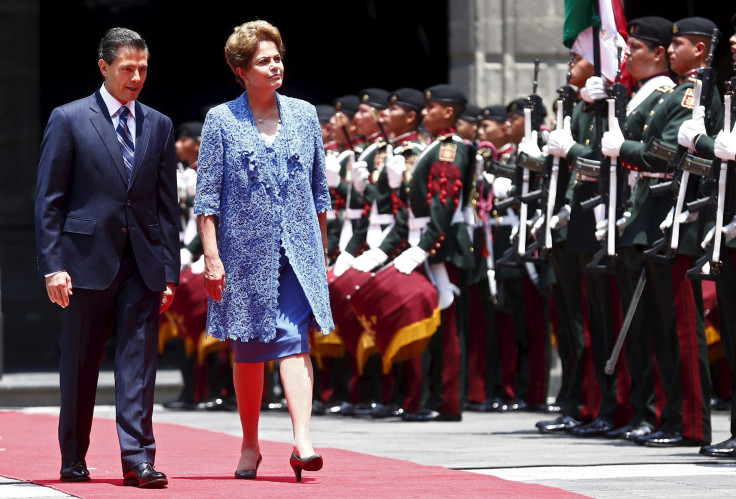Brazil’s President Visits Mexico To Strengthen Trade Ties

Latin America’s two biggest economies are gearing up to strengthen their relationship. Brazil’s President Dilma Rousseff kicked off an official visit to Mexico Tuesday, with a slate of agricultural, tourism and energy accords on the table.
The two-day trip marks Rousseff’s first official visit to Mexico during her presidency, which began in 2011. And she isn’t traveling alone: A delegation of business representatives is accompanying her to explore investment opportunities in Mexico, particularly after landmark energy reforms last year opened up Mexico’s oil sector to private investment for the first time in decades.
“Our countries represent the two largest markets in Latin America, and it is important that Mexico can make more investments in Brazil and vice versa,” Rousseff said in an interview with Mexican newspaper La Jornada Sunday.
“There are people who consider Brazil’s and Mexico’s economies to be competitors,” she added. “I believe that’s a wrong view. Our economies are complementary.”
Meanwhile, Mexican President Enrique Peña Nieto told Brazil’s Folha de São Paulo he hoped to finalize deals with Brazil on agriculture, tourism and aviation, adding that Mexico was consolidating a “strong relationship and deep economic integration with Latin America.”
Together the two economies make up 62 percent of Latin America’s economic output. Trade between Mexico and Brazil totaled around $9.2 billion in 2014, a 475 percent increase over the last 20 years. But trade and investment flows are heavily lopsided: Mexican companies have around $30 billion worth of investments in Brazil, Mexico’s undersecretary for Latin America told local media, while Brazil has around only $2 billion in investments in Mexico.
But this trip will allow trade and investments to grow on both sides, Brazil’s ambassador to Mexico, Marcos Leal Raposo Lopes, told Brazil’s Rio Times. “It is a good trade [volume] but small for the size of the economies,” he said. “This visit will lead to a reduction in barriers and a support of greater trade between the two countries.”
Both presidents are suffering from steep popularity dips. Rousseff won re-election in October by a slim margin, only to have her approval rating fall precipitously in the wake of a nationwide kickback scandal involving state-run oil company Petrobras.
Meanwhile, Peña Nieto, who came into office in 2012 with promises to turn Mexico into a global investment hot spot, saw his support dwindle as violence and corruption scandals overtook his reform-oriented agenda. On Monday Peña Nieto’s administration once again came under fire in the wake of a deadly shootout last week between suspected criminals and Mexican security forces. Officials maintained the incident, which resulted in the deaths of 42 suspected criminals and one police officer, was the result of a gun battle, while critics accused officers of executing the suspects.
© Copyright IBTimes 2024. All rights reserved.





















